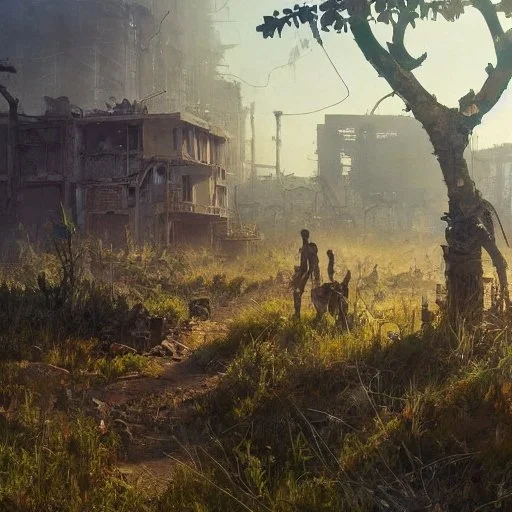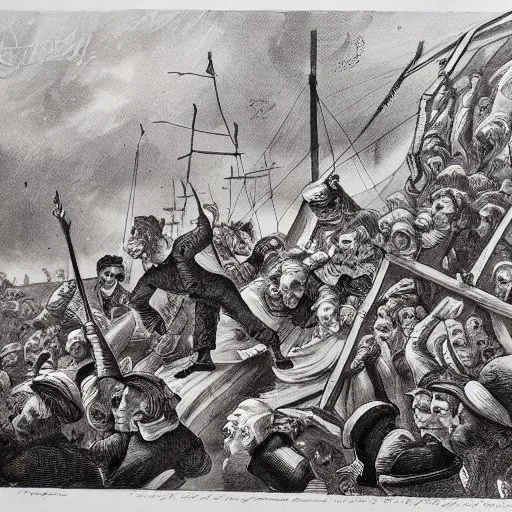Time flies! We’re almost through Q1 of ‘24, and I’ve been so busy listening to stuff that I haven’t yet found the time to tell you about all the stuff I’ve been listening to. That ends now! Here’s some new or new-to-me podcasts I’ve heard recently, and my thoughts about them:
AI generated art of me listening to things lately but without a shirt for some reason
The Chris Chatman Do-over
Some of my first forays into podcasts were episodes of Comedy Bang Bang, so I’ve got a special place in my heart for UCB-aligned improv audio comedy. If you’re really into that sort of thing, The Chris Chatman Do-over, from Amy Poelher’s Paper Kite Podcasts, will give you a quick hit, enough to ward off the shakes. The conceit is that right wing podcast shock jock Chris Chatman (played by Ike Barinholtz doing a sort of Joe Rogan thing) has had to relaunch his show after being sort-of-cancelled, and brings along his usual sycophantic sidekick, plus a Zoomer woman included to improve his audience in the female demographics. Everyone is a character, guests join, hilarity ensues, etc. It actually gets better the further it wanders from the bro podcast parody at its core, and luckily it’s improv, so sometimes it really wanders from that core. Plus, each ep is only about 25 minutes, and it’s obviously heavily-edited, so it’s not overstaying its welcome. One minor gripe – there were a few moments in the first few episodes that were almost like bloopers, where the actors break character. It took me right out! If you’re going to do a deadpan immersive improv comedy thing, stick with it til the bitter end and edit your corpsing out.
The Town with Matthew Belloni
All the news that’s fit to print from Tinseltown! As someone who both vaguely works in the entertainment industry and enthusiastically slurps up many of its products, this is an easy and enjoyable way to keep up with the business side of show business. Matthew Belloni founded Puck, which I have never read, but he is also a knowledgeable and, by the sounds of things, well-connected expert on the popular arts. Think movie studios, streaming platforms, awards ceremonies, major record labels, and sports broadcast deals. Belloni and a well-selected stable of guests deliver concise, enthusiastic insight into the business – and with multiple free episodes a week, it’s a good way for the time-poor to stay informed and cut through industry spin. The best part? Belloni and guests are not afraid to call a spade a spade. In an industry with surrounding discourse that can lean towards PR puff, it’s so refreshing to hear someone brave enough to deliver harsh criticism and even call bullshit on the bigwigs if required.
Joel Golby’s Book Club
Joel Golby has been dropping his musings on books he’s read into his Instagram stories for a while now, and someone has cleverly swooped in and said “how about a podcast?” It really works, better than you might think it would. See, Joel is a writer, and his Insta reviews were written captions, but of course podcasting is an audio medium. Yet he nails the transition and carries his voice across into the world of soundwaves. Although it’s frustrating to find yet another guy really can do it all, we must instead focus on our gratitude for what we are given, and these episodes are like little gifts to the listener. Breezy, gentle, 15-20 minute discussions of books, thoughtful and interesting even if you haven’t read it. I guess it’s less of a book club than a book recommendation series, but even in that it feels so intimate, just like in real life when someone carefully curates a book suggestion just for you. So far he’s covered books as diverse as an Annie Proulx short story collection and Eat Pray Love. It might be a psy-op by Big Novel to get more people reading – Joel frequently addresses the listener as if they were in a “reading funk” with gentle encouragement for how to get out of it. If so, it’s a psy-op I’m happy to fall under the spell of.
Dissect: Radiohead - In Rainbows
(sorry for the Spotify embed link, they made me do it)
I’ve never been a big Dissect head but boy did that change for this series – one of my favourite pieces of arts analysis I’ve ever read/listened to/consumed. If you haven’t heard the show before, it’s a close analysis of songs – the key, the meter, the timbre, the lyrics, the story behind the production, everything is considered in an attempt to dissect (ha) the music and find out what makes it tick, or not tick. This season, host Cole Cuchna presents an entire series on Radiohead’s In Rainbows, going track by track, episode by episode. Of course, being Radiohead, it very much does tick. I’m of the generation where this is the first Radiohead album I was really there for in real time, and this season of Dissect did something really special for me – it allowed me to listen to this old album with fresh ears, to hear new things in it, and to appreciate it all the more. Cuchna is an incredible host, an expert musicologist who can make everything accessible. And of course, this is the perfect format for a close musical analysis. The audio illustrations and recreations of all his points are executed absolutely flawlessly, and it really is a masterwork of podcast sound design that supports the content of a show. If you like In Rainbows, or Radiohead, or music, or life, I think you will find something interesting and maybe even inspiring in this show. I hope he makes a dozen more seasons about all my favourite albums.


































